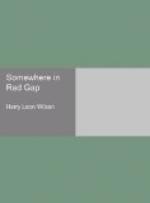“How do you like it?” I demanded, referring to the monstrous din.
“It’s great,” she said, plainly referring to something else. “One of them real upty-up weddings in high life, with orchestras and bowers of orchids and the bride a vision of loveliness—”
“I mean the noise.”
“What noise?” She put the paper aside and stared at me, listening intently. I saw that she was honestly puzzled, even as the chorus swelled to unbelievable volume. I merely waved a hand. The coyote was then doing a most difficult tremolo high above the clamour.
“Oh, that!” said my enlightened hostess. “That’s nothing; just a little bunch of calves being weaned. We never notice that—and say, they got the groom’s mother in here, too. Yes, sir, Ellabelle in all her tiaras and sunbursts and dog collars and diamond chest protectors—Mrs. Angus McDonald, mother of groom, in a stunning creation! I bet they didn’t need any flashlight when they took her, not with them stones all over her person. They could have took her in a coal cellar.”
“How do you expect to sleep with all that going on?” I insisted.
“All what? Oh, them calves. That’s nothing! Angus says to her when they first got money: ‘Whatever you economize in, let it not be in diamonds!’ He says nothing looks so poverty-stricken as a person that can only afford a few. Better wear none at all than just a mere handful, he says. What do you think of that talk from a man named Angus McDonald? You’d think a Scotchman and his money was soon parted, but I heard him say it from the heart out. And yet Ellabelle never does seem to get him. Only a year ago, when I was at this here rich place down from San Francisco where they got the new marble palace, there was a lovely blow-up and Ellabelle says to me in her hysteria: ’Once a Scotchman, always a Scotchman!’ Oh, she was hysteric all right! She was like what I seen about one of the movie actresses, ‘the empress of stormy emotion.’ Of course she feels better now, after the wedding and all this newspaper guff. And it was a funny blow-up. I don’t know as I blamed her at the time.”
I now closed a window and a door upon the noisy September night. It helped a little. I went back to a chair nearer to this woman with ears trained in rejection. That helped more. I could hear her now, save in the more passionate intervals of the chorus.
“All right, then. What was the funny blow-up?” She caught the significance of the closed door and window.
“But that’s music,” she insisted. “Why, I’d like to have a good record of about two hundred of them white-faced beauties being weaned, so I could play it on a phonograph when I’m off visiting—only it would make me too homesick.” She glanced at the closed door and window in a way that I found sinister.
“I couldn’t hear you,” I suggested.




